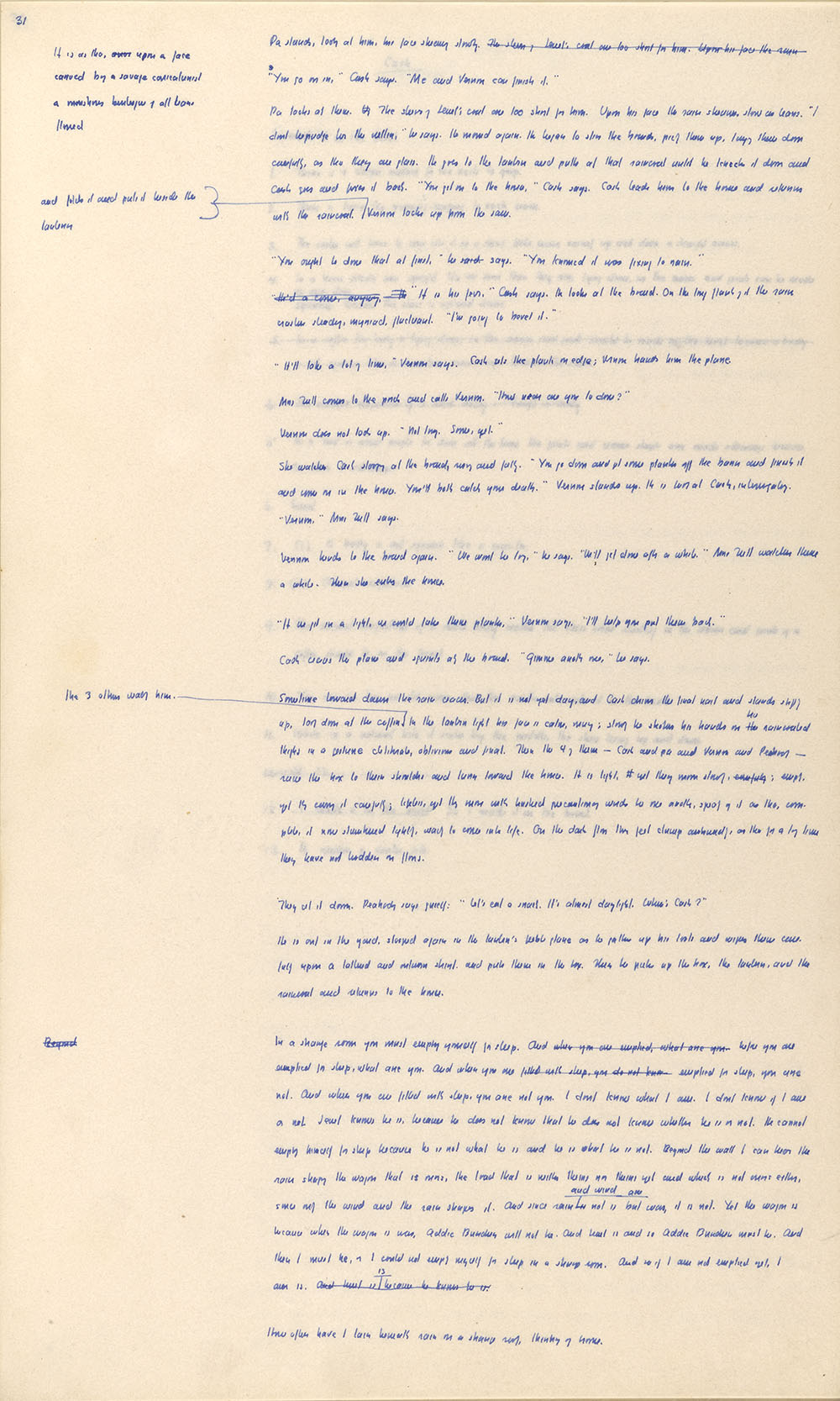TRANSCRIPTION
Pa stands, looking at him, his face streaming slowly. <The sleeves of Jewel's coat are too short for him. Upon his face the rain>
[margin: It is as tho, <over> upon a face carved by a savage caricaturist a monstrous burlesque of all tears flowed]
"You go in," Cash says. "Me and Vernon can finish it."
Pa looks at them. <Up> The sleeves of Jewel's coat are too short for him. Upon his face the rain streams slow as tears. "I
dont begrudge her the wetting," he says. He moved again. He began to [illegible] the boards, picking them up, laying them down
carefully, as tho they are glass. He goes to the lantern and pulls at that raincoat until he knocks it down and
Cash goes and fixes it back. "You get on to the house," Cash says. Cash leads him to the house and returns with the raincoat
[margin: and folds it and puts it beside the lantern]
Vernon looks up from the saw.
"You ought to done that at first," he <said> says. "You knowed it was fixing to rain."
<"He'd a come, anyway.> "It is his fever," Cash says. He looks at the board. On the long flank of it the rain crashes steadily, myriad, fluctuant. "I'm going to bevel it."
"It'll take a lot of time," Vernon says. Cash sets the plank on edge; Vernon hands him the plane.
Mrs Tull comes to the porch and calls Vernon. "How near are you to done?"
Vernon does not look up. "Not long. Some, yet."
She watches Cash stooping at the board, rising and falling. "You go down and get some planks off the barn and finish it
and come on in the house. You'll both catch your death." Vernon stands up. He is [looking?] at Cash, [interrogatively?].
"Vernon," Mrs Tull says.
Vernon looks to the board again. "We want to try," he says. "We'll get done after a while." Mrs. Tull watches them
a while. Then she enters the house.
"If we get in a tight, we could take those planks," Vernon says. "I'll help you put them back."
Cash ceases the plane and squints at the board. "Gimme another one," he says.
Sometime toward dawn the rain ceases. But it is not yet day, and Cash drives the final nail and stands stiffly
up, looking down at the coffin
[margin: the 3 others watching him.]
In the lantern light his face is calm, musing; slowly he strokes his hands on <the> his rainsoaked
thighs in a gesture deliberate, oblivious and final. Then the 4 of them – Cash and pa and Vernon and Peabody –
raise the box to their shoulders and turn toward the house. It is light, <[th?]> yet they move slowly, <carefully>; empty
yet they carry it carefully; lifeless, yet they move with hushed precautionary words to one another, speaking of it as tho, com-
plete, it now slumbered lightly, waiting to come into life. On the dark floor their feet clump awkwardly, as tho for a long time
they have not trodden on floors.
They set it down. Peabody says quietly: "let's eat a snack. It's almost daylight. Where's Cash?"
He is out in the yard, stooped again in the lantern's feeble glare as he gathers up his tools and wipes them care-
fully upon a tattered and [illegible] shirt, and puts them in the box. Then he picks up the box, the lantern, and the
raincoat and returns to the house.
In a strange room you must empty yourself for sleep. And <when you are emptied, what are you> before you are
emptied for sleep, what are you. And when you are <filled with sleep, you do not know> emptied for sleep, you are
not. And when you are filled with sleep, you are not you. I dont know what I am. I dont know if I am
or not. Jewel knows he is, because he does not know that he does not know whether he is or not. He cannot
empty himself for sleep because he is not what he is and he is what he is not. Beyond the wall I can hear the
rain shaping the wagon that is ours, the load that is neither theirs nor theirs yet and which is not ours either,
since only the wind and the rain shapes it. And since rain <is> and wind are not is but was, it is not. Yet the wagon is
because when the wagon is was, Addie Bundren will not be. And Jewel is and so Addie Bundren must be. And
then I must be, or I could not empty myself for sleep in a strange room. And so if I am not emptied yet, I
am is. <And Jewel is because he knows he is.>
How often have I lain beneath rain in a strange room, thinking of home.
|


